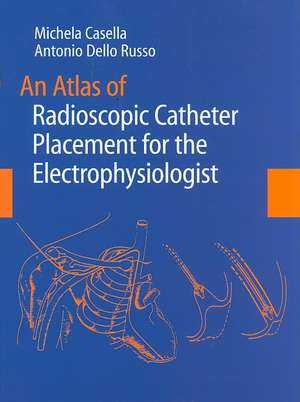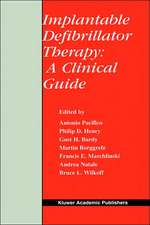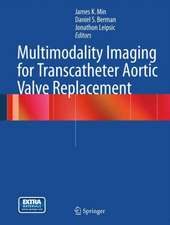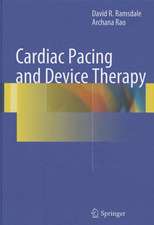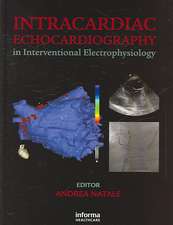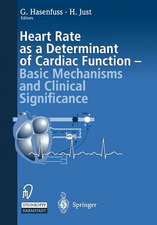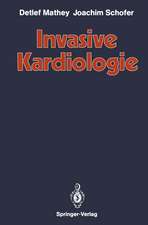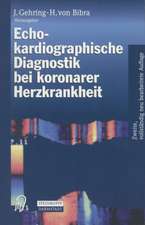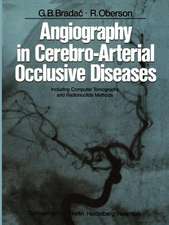An Atlas of Radioscopic Catheter Placement for the Electrophysiologist
Editat de Michela Casella P. Della Bella Editat de Antonio Dello Russo Andrea Nataleen Limba Engleză Hardback – 2 sep 2008
| Toate formatele și edițiile | Preț | Express |
|---|---|---|
| Paperback (1) | 1801.57 lei 6-8 săpt. | |
| SPRINGER LONDON – 27 noi 2014 | 1801.57 lei 6-8 săpt. | |
| Hardback (1) | 1629.26 lei 38-44 zile | |
| SPRINGER LONDON – 2 sep 2008 | 1629.26 lei 38-44 zile |
Preț: 1629.26 lei
Preț vechi: 1715.02 lei
-5% Nou
Puncte Express: 2444
Preț estimativ în valută:
311.79€ • 323.67$ • 259.99£
311.79€ • 323.67$ • 259.99£
Carte tipărită la comandă
Livrare economică 20-26 martie
Preluare comenzi: 021 569.72.76
Specificații
ISBN-13: 9781848002265
ISBN-10: 1848002262
Pagini: 338
Ilustrații: XVI, 313 p.
Dimensiuni: 210 x 279 x 30 mm
Greutate: 1.23 kg
Ediția:2008
Editura: SPRINGER LONDON
Colecția Springer
Locul publicării:London, United Kingdom
ISBN-10: 1848002262
Pagini: 338
Ilustrații: XVI, 313 p.
Dimensiuni: 210 x 279 x 30 mm
Greutate: 1.23 kg
Ediția:2008
Editura: SPRINGER LONDON
Colecția Springer
Locul publicării:London, United Kingdom
Public țintă
Professional/practitionerCuprins
Radiology.- X-Ray Anatomy of the Heart.- Computed Tomography of Anatomy of the Heart.- Electrophysiology.- The Electrophysiologic Study.- Ablation of Supraventricular Tachycardias from the Right Atrium.- Approach to the Left Heart Chambers.- Accessory Pathways Ablation.- Atrial Fibrillation Ablation.- Ventricular Tachycardia Ablation.- Pacing.- Pacemaker and Implantable Cardioverter-Defibrillator Implantation.- Biventricular Pacemaker and Implantable Cardioverter Defibrillator.- Pacemaker and Implantable Cardioverter Defibrillator Lead Extraction.- Endomyocardial Biopsy.- Endomyocardial Biopsy.
Recenzii
From the reviews:
"This is an in-depth pictorial review of fluoroscopic anatomy related to electrophysiological studies, including pacing and radiofrequency catheter ablative procedures. … It will be of interest to practicing cardiologists, elctrophysiologists, and cardiology and electrophysiology fellows in training. This atlas may also be of interest to personnel in cardiac catheterization and electrophysiology laboratories, such as nurses and technicians, who work closely with elctrophysiologists. … All chapters are well organized with numerous images and procedural descriptions." (Anil Verma, Doody’s Review Service, February, 2009)
"This is an in-depth pictorial review of fluoroscopic anatomy related to electrophysiological studies, including pacing and radiofrequency catheter ablative procedures. … It will be of interest to practicing cardiologists, elctrophysiologists, and cardiology and electrophysiology fellows in training. This atlas may also be of interest to personnel in cardiac catheterization and electrophysiology laboratories, such as nurses and technicians, who work closely with elctrophysiologists. … All chapters are well organized with numerous images and procedural descriptions." (Anil Verma, Doody’s Review Service, February, 2009)
Textul de pe ultima copertă
The heart is a four-dimensional structure, comprising three spatial dimensions of shape and one temporal dimension of motion. Many technological advances in the field of imaging, such as intracardiac echocardiography, computed tomography, magnetic resonance imaging and 3-D electroanatomical image integration mapping systems, have enhanced our ability to visualize, map, and navigate in the heart. Nevertheless, fluoroscopy remains the cornerstone of all interventional electrophysiology procedures and, with the limitations of current technologies, will continue to be extensively used for many years to come.
A skilled fluoroscopist with the use of multiple projections can deduce the anatomy and catheter location with remarkable spatial detail. However, since fluoroscopy provides a real-time unmodified view to the operator, there is no easy way to organize the multiple measurements taken from a moving catheter into a more clinically useful model of cardiac electrical activity. As a result, significant clinical experience with fluoroscopy is necessary to accurately position catheters at an exact intracardiac site.
Atlas of Radioscopic Catheter Placement for the Electrophysiologist is unique because it is the first book that provides a teaching tool for fellows in training, allied health professionals and accomplished electrophysiologists on relevant X-ray views commonly encountered in different electrophysiology procedures, and how these views correlate with cardiac anatomy. It was specifically designed to address this challenging aspects of all electrophysiology procedures systematically and is written in a perspicuous manner to demystify the subject, thus making it easier to better understand cardiac anatomy and successfully perform electrophysiology procedures.
A skilled fluoroscopist with the use of multiple projections can deduce the anatomy and catheter location with remarkable spatial detail. However, since fluoroscopy provides a real-time unmodified view to the operator, there is no easy way to organize the multiple measurements taken from a moving catheter into a more clinically useful model of cardiac electrical activity. As a result, significant clinical experience with fluoroscopy is necessary to accurately position catheters at an exact intracardiac site.
Atlas of Radioscopic Catheter Placement for the Electrophysiologist is unique because it is the first book that provides a teaching tool for fellows in training, allied health professionals and accomplished electrophysiologists on relevant X-ray views commonly encountered in different electrophysiology procedures, and how these views correlate with cardiac anatomy. It was specifically designed to address this challenging aspects of all electrophysiology procedures systematically and is written in a perspicuous manner to demystify the subject, thus making it easier to better understand cardiac anatomy and successfully perform electrophysiology procedures.
Caracteristici
Up-to-date illustrative guide to the technique Includes extensive details on arrhythmia ablation Contains an extensive annotated bibliography detailing the major references
